Executive summary
South West AgriTech – developing the region’s AgriTech powerhouse…
This positioning paper states the case for the South West’s position as the UK’s growing powerhouse in AgriTech, supported by the work of a collaboration of cross-sector partners under the banner of South West AgriTech.
Definition of AgriTech:
Any technology on the farm or that crosses the threshold of the farm, for use in agriculture, horticulture, or aquaculture which increases productivity and sustainability.
South West AgriTech comprises of six Local Enterprise Partnerships (LEPs) – Cornwall and Isles of Scilly, Dorset, GFirst (Gloucestershire), Heart of the South West (Devon, Plymouth, Somerset and Torbay), Swindon and Wiltshire and West of England (Bath & North East Somerset, North Somerset, Bristol and South Gloucestershire); supported by a steering group of currently 30 members drawn from the six local enterprise partnerships and their local partners, academia and government agencies.
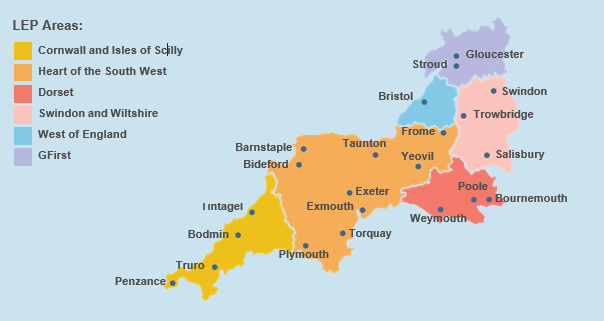
The South West is England’s largest and most rural region with rich, diverse natural resources. The South West has a long history of supporting new ideas, new ways of doing things, new products and services and new business models. Its 14 universities have a range of research specialisms, and the region also benefits from a substantial number of applied research, technology and advanced manufacturing centres that foster collaboration between universities and industry.
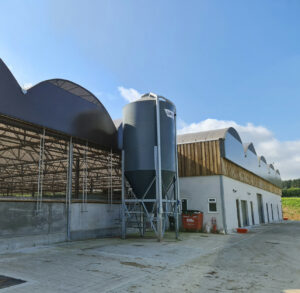
The region’s ideas are also driving business: spinouts and tech start-ups are rapidly growing in number thanks to some of the best incubator support in the world. The region’s cohesive approach on supporting agricultural technology businesses creates significant opportunities to boost productivity, employment, innovation and skills in this sector. This has led to a strong and growing cluster of over 200 high-value innovative AgriTech companies and 64 business support organisations (including centres of excellence) from Cheltenham in Gloucestershire to Cornwall and the Isles of Scilly.
As set out in this document, AgriTech is seen in the South West as a key economic driver, contributing towards reaching the national ambition of 2.4% of gross domestic product (GDP) investment in research and development (R&D) by 2027. We will ensure that innovative businesses can access the skills they need, and that the innovation ecosystem is supported, to maximise the benefits for the South West region, the UK and our AgriTech customers overseas.
Introduction
Small to medium-sized AgriTech companies in the South West generate over £371 million turnover each year. The area also attracts many major employers including Arla Foods UK, Danone, Mole Valley Farmers, Thatchers Cider, Velcourt, ABP Food Group, DuPont, Glencore Agriculture. Saputo (Dairy Crest),and Yeo Valley which means that Agri-companies in the South West contribute in excess of an estimated >£3 billion in GVA to the UK economy. Figure 1 is an image from South West AgriTech’s mapping exercise of companies and agri specialist organisations in the South West – demonstrating the region’s AgriTech innovation resources and capability.
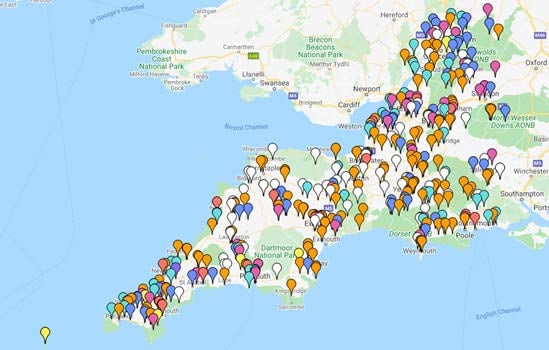
Why focus on AgriTech?
Simply put, AgriTech is needed to help the world to sustainably meet its demand for good quality, safe food (United Nations, FAO, 2020), and this means that it is both a One Health necessity needed to maintain good human and animal health and a lucrative domestic and international market.
The agricultural sector is the single largest employer in the world, providing livelihoods for 40 pecent of today’s global population. The United Nations has set a target to double the agricultural productivity and incomes of small-scale food producers, and ensure food production systems are sustainable by implementing resilient agricultural practices by 2030.
The UK AgriTech industry is worth £14 billion and employs over 500,000 people. The UK is a world leader in developing technologies that improve productivity and reduce pressure on scarce resources (UK Gov, 2020/21).
West of England – LettUs Grow Limited:
LettUs Grow combine their innovative aeroponic technology and Ostara® control software to create the market’s leading vertical container farm. A DROP & GROW™ container farm aims to meet the rising demand for local sustainable produce and supply a community 365 days a year. Providing food near the point of consumption reduces waste and food production’s carbon footprint.

The global AgriTech market was valued at $17,442.7 Million in 2019 and is projected to reach $41,172.5 Million by 2027 with a CAGR 12.1%. Agriculture plays a crucial role in the economic growth of some of the largest nations across the globe which include the US, China, India, Brazil, and Russia. With a continuously growing global population and rising demand on agricultural output fuelling demand, the investments in agriculture technology solutions have been growing at an impressive pace worldwide (BusinessWire, 2021).
The South West has companies that are innovating in some of the key technologies that are penetrating the global agriculture sector include data analytics, artificial intelligence, internet-of-things, machine learning, automation systems, and software as service solutions, among many others.
Dorset – Cropdesk Limited:
Achieving consistently high yields and quality across variable and challenging growing seasons is difficult. The cloud computing platform Cropdesk helps farmers to track the progress of crop performance and farm labour use in real time, to allow them to make cost-effective decisions on future cropping and production.
Additionally, the evolving business and revenue models in agriculture sector, market consolidation with bigger players investing in smaller players to achieve economies of scale and vertical integration, the growing need for precision and sustainable/green farming, and rising investments in potential high-growth agritech companies, are some of the key factors that are fuelling the growth of the global AgriTech marketplace (sic, 2021).
Cornwall and Isles of Scilly – Bennamann Ltd:
Global agri-tech company CNH Industrial has bought into Cornish biofuel pioneer Bennamann Ltd in a deal which will accelerate its growth. Bennamann develops and markets technology to capture and repurpose fugitive methane gas emissions from agricultural and other sectors. It prevents this harmful greenhouse gas entering the atmosphere and processes it into liquid methane for distribution and use as an energy-rich renewable biofuel.
Swindon and Wiltshire – Small Robots Company Ltd:
Small Robots Company are a start-up company focused on revolutionising the way that technology is used to create food, considerably increasing productivity (trial plots yielding as much as 20 tonnes of wheat per hectare, versus the average of 8.4 tonnes on UK farms), while reducing threats to biodiversity. They use three small robots, Tom, Dick and Harry, and the AI brain Wilma, to plant, monitor and treat arable crops autonomously. This will enable farmers to be more efficient, precise, and productive, and is also kinder to soil and the environment.
The global population is projected to grow to 9.7 billion in 2050 and at least 60% more food production will be needed to feed the world’s population, while at the same time the challenge of embedding a regenerative and sustainable approach to our food production systems is an imperative. Therefore, to escalate production, use of advanced disruptive technologies such as IoT, robotics, ground sensors, data intelligence, vertical farming, and precision farming in agriculture is growing. Other innovations in this space also include agri-pharmaceuticals, low-carbon artificial soils, and regenerative and restorative agriculture. The South West has AgriTech organisations working in all of these spaces.
The South West’s AgriTech offer is aligned with the UK Government’s strategies related to the (Building Back Better) Plan for Growth (UK Industrial Strategy), the Green Industrial Revolution aims, Net Zero ambition to reduce emissions, the Environment Bill (including Defra’s Environment Land Management scheme) and the vision for the UK to become a technology super-power, including in Food Tech, to increase export opportunities under the banner of a Global Britain.
Global Britain (exports): The AgriTech and Food and Drink sectors and the cross over agri food production are key to the South West Region’s exports . Food and Drink exports from the South West totalled £804.6 million in 2020, and the Department of International Trade (DIT) in the South West has 204 companies actively promoting their food and drink products on the Great British Food Programme, a website to showcase products to buyers overseas markets . AgriTech was given enhanced priority by the DIT in this Region. 2000 companies were identified on their records with an interest in agriculture , and an AgriTech networking Cluster has been established to ensure export-ready companies in the AgriTech sector can access DIT support across the world.

The Cluster now comprises 69 active exporters from the AgriTech sector, and a further 18 companies in the sub-sector companion animals and equine. 150 meetings were arranged between Cluster member companies and Commercial Officers in our Embassies overseas, so that companies could showcase their products or services, and learn about potential business in target markets. Further plans are in place to promote a range of events for exporting agri-tech companies, including a buyer event, plus meetings about India, the Middle East and aid Funded Business opportunities.
AgriTech - capability and plans for growth
The place to start up your AgriTech business
The South West provides unparalleled support for AgriTech businesses to develop and grow. In the region there are business growth hubs, incubators and accelerators as well as networks of LEP Invest programmes and Growth/Enterprise Zones to provide business expertise, tax incentives and access to funding to stimulate the start-up and scale-up of businesses. The region’s capability to support these companies has led to the largest and fastest growing network of high growth SMEs in the UK AgriTech sector. Examples include:
In Gloucestershire, two thirds of their extensive network of high growth SMEs operate in mainland Europe with the balance operating throughout the US and Africa. Investment received by local AgriTech businesses is >£32M, with 200 SMEs supported by the business incubator at The Royal Agricultural University’s Farm491 (the UK’s first and largest AgriTech business incubator) and through demo farms such as Hartpury and Farm-Ed (practical demonstration sites for technology and good food and farming education). There is also access to a network of 15,000 experts serving the agricultural service industry including agronomy and livestock consultants, large veterinary practitioners, land agents and solicitors. Future funded plans include projects in Net- Zero in farming practices, farm innovators peer-to-peer data sharing, accelerate the development of dynamic procurement platforms with traceability, sustainability, origin and ingredient credentials and develop digital mapping to bring together digital systems, data infrastructure and data security protocols to map natural capital and productive assets.

West of England’s The FoodWorks SW, is a vibrant new centre of excellence for nurturing food and drink business, with state-of-the-art facilities, technical support and expert advice for start- up and potential high growth companies. Connecting producers to collaborate, innovate, identify new markets and create jobs within the sector. It comprises of eight 1000 sq/ft and four 1500 sq/ ft purpose-built food-grade business units with fully equipped facilities for product development and comes with on-site technical support and business support with local, regional, national and international expertise. The area also has the Bristol Centre for Agricultural Innovation to support and grow agricultural science based within the University of Bristol, through research, innovation, application and promotion.
Dorset’s AgriTech sector is currently worth £108m and employs around 700 people. Dorset provides innovative start-ups and high-growth companies with fully funded support to locate and grow their businesses through a One Health collaborative which includes land management and property locator, aquaculture expertise, business showcasing/support and bid writing support resources. Dorset Innovation Park is an advanced engineering cluster of excellence for the South West and houses an AgriTech Innovation Centre focused on innovations in farming ventilation systems. Plans for growth include the development of a University Centre and Business Hub, which will help incubate and accelerate businesses, with one of its aims being to generate a pipeline of 40 new high-worth clean-growth One Health businesses by 2030. Dorset is home to many private and public aquaculture players, including Cefas (UK Government’s Centre for Environment Fisheries & Aquaculture Science). Cefas is a world leader in marine science and technology, providing innovative solutions for the aquatic environment, biodiversity and food security.
Swindon and Wiltshire have a well-established and thriving agricultural, food and drink sector, with a growing network of dynamic innovative companies with a market specialism in AgriTech. Swindon and Wiltshire, Bristol and Dorset are also in a league table of top 20 high value manufacturing hotspots. High value manufacturing is one of Swindon and Wiltshire’s key sectors. AgriTech SMEs can benefit from accessing a network of high-value manufacturing and advanced engineering innovation and R&D facilities at the heart of Industry 4.0.
Heart of the South West’s research in real-world farming expertise is made available to SMEs through the unique global and national research facility (United Nations FAO exemplar site) of the North Wyke Farm Platform (Rothamsted Research), and through the dairy exemplar facilities at Kingshay. These facilities offer a platform for industry to trial and review new ideas for the benefit of dairy farmers throughout the UK. The key areas of focus are to demonstrate profitable and resource efficient milk production, integrate robotic milking, use the latest technology available to optimise animal welfare and sustainable milk production with precision grazing and provide state- of-the art facilities for research, development and demonstration.
The University of Plymouth:
Has been pioneering robotics technology for two decades. Currently much of this expertise is being channelled into the development of agricultural and marine robots, sensors and autonomous platforms to work in hazardous areas. Working closely with farmers and industry, this has the potential to offer large benefits to environmental sustainability, global food production and security. This work is being led by the newly formed ARES (Agricultural Robotics and Environmental Sensors) group, working with a number of spinout and start up companies including Fieldwork Robotics Ltd and Robotriks Ltd. pursuing research in mobile robotic platforms for farm surveillance and crop care, as well as the development of robots for harvesting soft fruit and vegetables.
Cornwall and the Isles of Scilly’s £11.8 million Agri-tech Cornwall Project (ACP) – part funded by the European Regional Development Fund, Cornwall Council and the Council for the Isles of Scilly – has worked with 108 SMEs to support the research and develop of game-changing technological innovations in agriculture, with 20 game-changing Agri-entrepreneurs entering the global and domestic market for the first time in 2021/22. The ACP has also developed Future Farm, a Dairy Systems Research Platform, at Duchy College a specialist facility to improve efficiency, welfare and technological advancement in dairy farming, which is also supported by the Centre for Innovation Excellence in Livestock (CIEL). University of Plymouth is looking to work in Cornwall and across the region to explore restorative and regenerative agriculture farming principles and practices that increases biodiversity, enriches soils, improve watersheds, and enhances ecosystem services.
The place to access the knowledge to grow your AgriTech business.
In the South West relationships are in place to facilitate the frictionless access to knowledge-based assets from the highest concentrations of agricultural academic and teaching institutions in the UK. This enables access to >600 sector specific academics and 58 specialist centres/sub-centres of excellence. By enhancing the capacity to undertake innovation activities, translational research, and skills transfer, and by providing a pipeline of talent for the agriculture workforce, it removes barriers to commercial development and exploitation. This unparalleled support has significantly contributed to the region’s reputation as a growing AgriTech super-power. Examples include:
‘Food Forever’ is Gloucestershire’s bold mission to create a healthy circular economy in food and farming. Gloucestershire brings together thought leaders in research, development and market innovation to engage with industry. It has the Royal Agricultural University in Cirencester which is the home of Farm491 and offers land for research and testing. Hartpury University and Hartpury College’s Tech to Plate Centre offers real on farm demonstrations of the latest technology to farmers, producers and students. The key objective is to showcase the full potential that technology can bring to overall farm performance and productivity. The county also has Happerley (Centre of Excellence in food and drink provenance), Campden BRI (a national and international leader in food chain research and advisory services) and The Countryside and Community Research Institute (CCRI), part of the University of Gloucestershire, the largest specialist rural research centre in the UK. Future plans are to further develop advanced AgriTech skills, include transformative partnerships between colleges, universities and commercial training providers to develop world-leading technical and business skills. In addition, Farm-Ed is a new centre for farming and food education focussed on the crucial link between good food and farming. Knowledge Exchange facilities include crop rotation and trial plots, natural flood management, woodlands, wildlife habitats, livestock, orchards and apiary.
Swindon and Wiltshire has developed research and innovation resources at the Science Museum, Wroughton. The site is being developed into a location where innovation, energy, technology and creative sectors can thrive, collaborate and engage with a wide range of audiences. The Science Museum Group will work with commercial and institutional partners from a range of sectors including AgriTech where there is crossover with renewable energy generation, energy storage, automotive testing, data storage and technology R&D. In addition, Porton Science Park is geared to play a critical role in achieving the vision for the Life Sciences sector in the county and it is spearheaded by a long-term strategy to become a world-class cluster for expertise and life sciences activity in the UK – this includes the opportunity for businesses to access life sciences expertise in bioanalysis, food safety and biotechnology.
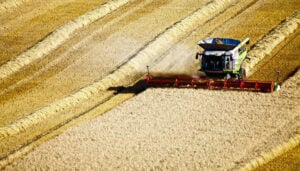
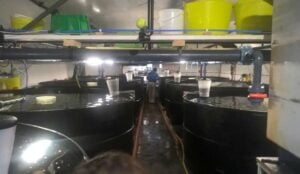
Dorset has knowledge-assets to support the development of start-ups and to accelerate them to growth. Kingston Maurward is a large land-based college with a strong portfolio of Knowledge Exchange projects including: Stewarts AgriTech Glasshouse – this will allow Stewarts Garden Centres to grow a wide variety of plants and supply other south coast garden centres and farm shops with Dorset grown plants, reducing reliance on imports and safeguarding rural jobs. Stewarts Agritech Glasshouse will not only ensure commercial success, but it will also be a base of horticultural education for local schools and colleges, showcasing horticultural practice, AgriTech machinery, and low-carbon technology. Kingston Maurward’s University Centre and Business Hub, which will provide connections with academics from its own highly trained and experienced workforce, from four world class universities, and from a wide range of industry specialists, will deliver tailored business support to AgriTech entrepreneurs. Kingston Maurward also provides training for the future workforce through courses run through its state-of-the-art AgriTech Innovation Centre, including in aquaculture. Dorset also has Cefas, the Centre for Environment, Fisheries, and Aquaculture Science – the government’s marine and freshwater science experts. They provide data and advice to the UK government and provide their know-how to business/industry.
In the Heart of the South West there are a number of existing knowledge-based assets that can support industry, including universities, specialist centres of excellence and several land based colleges – e.g., University of Exeter (Centre for Rural Policy Research, the Global Systems Institute, the European Centre for Environment and Human Health and the South West Centre of Excellence in Satellite Applications), the University of Plymouth’s Derriford Research Facility, the Met Office, Food Security and Land Research Alliance, Bicton College, University of plymouth (Soft and Adaptive Robotics Lab, Analytical Testing Facilities, Brixham Laboratory, Sustainable Earth Institute, Plymouth Marine Sciences Partnership, Rothamsted Research (North Wyke Farm Platform), Kingshay and the world renown marine science centre of excellence SAHFOS. The Institute for Data Science and Artificial Intelligence (IDSAI) and The Joint Centre for Excellence in Environmental Intelligence (JCEEI) have also been created through new partnerships between the University of Exeter and the Alan Turing Institute and the Met Office, respectively, to apply cutting- edge data science methodologies to pioneer the development of Artificial and Environmental Intelligence research, deliver interdisciplinary education and training and develop innovative solutions, particularly within the themes of climate, environment, sustainability and health.
The Environmental Intelligence Accelerator is a future proposal to unlock the power of the data and the application of AI to optimise environmental related decision making. By enhancing the capacity to undertake innovation activities, translational research, and skills transfer, it will remove barriers to commercial exploitation (including the ‘valley of death’ in the translation of foundation research to a commercially viable environmental intelligence solution). This will ensure the region leads on the development of a global market for environmental intelligence solutions. Headquartered in Exeter with regional hubs in Plymouth, Taunton and Falmouth (in Cornwall), the Accelerator will develop a region-wide network across the Heart of the South West and Cornwall and Isles of Scilly LEP areas.
University of Plymouth’s ARES group consists of academics, researchers and technical experts with expertise in robotics, sensor development, electronics and computing, alongside agricultural, environmental, plant and soil science. Currently, Ares has access to dedicated laboratories on the main Plymouth campus alongside plant factory, greenhouse and growing facilities. With an investment of approx. £55m, these facilities are soon to be expanded significantly through the construction of a new landmark engineering and design facility. This building will provide an innovative new home for the School of Engineering, Computing and Mathematics. It will also create more than 10,000m² of research and teaching space, including state of the art equipment that will prove invaluable in the construction and testing of AgriTech robotics and sensor platforms. ARES works alongside and forms part of the University Sensor Group with over 100 cross disciplinary academic and research members with expertise in marine; environment, health & medicine, business and creative industry/arts.
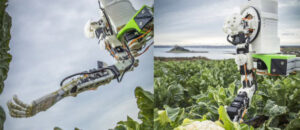
Cornwall & Isles of Scilly has knowledge-assets for AgriTech businesses through e.g., Rural Business School at Duchy College which provides research, consultancy and knowledge transfer for industry and government, it is part of the Rural Business Research consortium that delivers the Farm Business Survey for England. Cornwall College group, which includes Duchy College, also has five campuses in Cornwall – Rosewarne (horticulture), Newquay (animal sciences and conservation), Stoke Climsland (dairy), Eden Project Learning (horticulture and land restoration) and Falmouth Marine School (marine engineering and science). Other globally renown assets include the South West’s Satellite Applications Catapult, the University of Plymouth, Marine Biology and Ecology Research Centre, the world-class Environmental Futures programme at Falmouth University and the Environment and Sustainability Institute and the Centre for Ecology and Conservation based at the University of Exeter’s Penryn Campus.
>600 academics in agri-food applied research, knowledge exchange and education
Areas of specific interest
Animal health
The UK has one of the most robust and comprehensive legal frameworks protecting animals on farms, extremely mature and well-developed industry bodies that recognise the importance of animal welfare, and a significant number of credible quality assurance and welfare schemes and/ or initiatives (Countryside/NFU, 2020). In the South West, the animal health expertise includes the following regional assets:
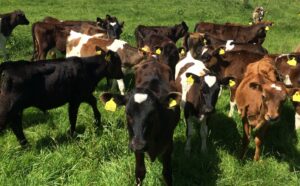
Bristol Veterinary School – accredited by the American Veterinary Medical Association, the Royal College of Veterinary Surgeons and the major veterinary bodies from Europe, Australasia and South Africa – reflecting the school’s position as a world leader in animal health in terms of exemplary education, and research and innovation in Population Health and Global Food Security. The school has the John Oldacre Centre: Farm Research Data Platform to, e.g., understand animilar resilience to intensified production while ensuring sustainable resource use, animal welfare, disease and resistance dynamics, etc. The farm research data platform will also be available through CIEL- Bristol to support dairy industry R&D.
Hartpury University and College (UK’s largest agri-education institution and a pioneer in the equine industry) – has been at the heart of UK equestrianism for more than 25 years and continues to lead the way with a cutting-edge centre for equine therapy, which has helped thousands of horses to stay healthy and optimise their performance. The centre includes an aqua fit water treadmill, the first of its kind in the UK. With access to 230 horses on site, and the resources of an Equine Academy, it provides unparalleled access to data and research facilities for the equine industry on the maintenance of equine health.
The GW4 Alliance (Bath, Bristol, Cardiff and Exeter universities – GW4) – formally launched their new ‘One Health’ antimicrobial resistance research consortium in 2021. The World Health Organisation cites antimicrobial resistance (AMR) as one of the most significant risks facing the world. AMR threatens global health and development as it impacts on human, animal and plant health and also our environment, water safety and food security. In our context this alliance will therefore work with industry to find ways of combating AMR to ensure that animal health can be maintained and improved now and in the future. They will maximise opportunities to coalesce expertise, e.g., across genomics, experimental science, drug discovery, diagnostics and clinical, public health and environmental science.
Cefas (Centre for Environment Fisheries and Aquaculture Science) – tackles the serious global problems of climate change, marine litter, over-fishing and pollution. They are the UK Government’s marine and freshwater science experts. They provide research, advice and consultancy related to issues that impact on the health and welfare of aquatic animals, including hosting the international database on aquatic animal disease.
Rothamsted Research’s North Wyke site – hosts a 350ha beef and sheep farm and is home to the North Wyke Farm Platform National Capability. The research at North Wyke aims to demonstrate the true impact and value of ruminant livestock systems through improvement in efficiencies of pasture-fed livestock whilst reducing emissions to the atmosphere and water courses and improving ruminant health and nutrition.
The Cornwall College Group has four campuses in Devon and Cornwall – Duchy College at Stoke Climsland and Rosewarne, at Newquay and at Bicton College – with animal health expertise and knowledge hubs for best practice, new farming innovations and animal health and welfare.
Aquaculture
Aquaculture is the farming of fish, crustaceans, molluscs, aquatic plants, algae, and other organisms. It is projected to be the prime source of seafood by 2030, creating a global market in excess of £200 billion. The UK domestic aquaculture industry is the 8th largest producer of fin fish from marine and coastal aquaculture in the world, and worth an estimated £1.4 billion a year currently (Cornwall & Isles of Scilly LIS).
The South West boasts the 2nd largest fishing port in England with £29.9 million of landings annually, the worlds deepest and widest natural harbours (only 2nd to Sydney, Austrailia) used for fin fish, muscle and oyster production; innovative Government funded projects to investigate the use of low-carbon methods for developing a sustainable aquaculture industry, including the creation of sustainable lobster production and the development of novel artificial reefs; and has the accolade of being the region designated as the UK Government’s High Potential Opportunity area in sustainable aquaculture.
The South West’s thriving aquaculture sector has been identified by the Department for International Trade (DIT) as a High Potential Opportunity (HPO) for inward investment, with a specific focus in the Dorset area. The excellent water quality of Dorset’s inshore waters has enabled a diversity of aquaculture to develop and there is significant potential for this sector to expand at sea and on land.
The region is also home to Cefas (Centre for Environment Fisheries & Aquaculture Science), a world leader in aquaculture and environmental science. Cefas has undertaken the first full-scale mapping exercise to identify potential sites to develop new aquaculture projects, including business ventures. This has been undertaken for Dorset and East Devon and has the potential to be rolled out across the region, helping to enable new aquaculture companies to start up more easily in the UK and to accelerate their business growth.
The opportunities generated by the HPO and Cefas are aligned with the ambitions of Maritime UK South West (MUK SW), a strategic partnership that brings together the breadth of South West England’s ocean economy, working in partnership to champion, grow and clean the marine sector. By aligning the region’s existing and emerging strengths, MUK SW creates a circular knowledge economy enabling government, industry and academia to work together at pace, with unified purpose, to deliver clean sector growth building practical “development to delivery” pathways. Key research organisations involved in MUK SW include applied research from University of Plymouth, Plymouth Marine Laboratory, University of Exeter, UKHO, Met Office, Cefas, SAHFOS/The Marine Biological Association, and Bournemouth University. Key aquaculture companies involved are Cornish Seaweed Company, Offshore Shellfish, Applied Genomics, Seafish, and ARC Marine.
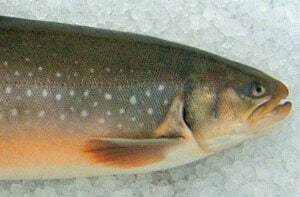
The South West Aquaculture Network (SWAN), part of MUK SW, aims to sustainably enhance aquaculture production in line with the evolving national aquaculture strategy and international development goals. SWAN is comprised of diverse members representing industry, academia and
public sector organisations, providing distinct capabilities including:
- Unique aquaculture facilities
- Technical and operational knowledge
- Research and innovation development
- Partnerships and engagements
Aquaculture in the South West capitalises on the region’s world class science, progressive supply chain and dynamic business environment to develop sustainable land and sea based aquaculture systems represent opportunities for the aquaculture sector.
Examples include:
On Land: Recirculating Aquaculture Systems (RAS) to create suitable conditions for aquaculture using indoor tanks, pumps, aerators and filters; Aquaponics systems using hydroponics (growing plants without soil) provide opportunities to strengthen sustainable aquaculture, organic crop production and reduce water consumption.
In the Sea: Developing technology and alternative methods of combating diseases that minimise
environmental impacts; along with shellfish farming equipment designed to perform in extreme
environments.
Plant and soil health
Arable AgriTech must have its heart focused on plant health to optimise yields and the good quality of the crop destined for human or animal consumption. All of the South West university assets in this positioning document have work dedicated to understanding, optimising and sharing data on plant health and form an unparalleled asset to businesses developing innovations in this area.

The South West has also had a long relationship with the specialist AgriTech-Centre Crop Health & Protection (CHAP). CHAP’s mission is to increase crop productivity for future generations through the uptake of new technologies in agriculture. They build networks of world-class scientists, farmers, advisors, innovators and industry to prioritise needs, develop innovative agri-tech solutions and translate them into the field to ensure market adoption. The Soft-Fruit Analysis project assessed the latest in plant monitoring technology through a collaboration between Rothamsted Research, FOTENIX and CHAP.
Rothamsted (Plant Sciences) – have research priorities focused on understanding the ways that plants function with the aim of improving crop productivity and quality (health). Rothamsted benefits from a unique combination of knowledge, expertise, facilities and resources. The multidisciplinary teams have expertise in molecular biology, bioinformatics, biochemistry, modelling and plant and crop physiology. Resources include: plant transformation and genome editing; GM field trial facility; Lipidomics platform; large scale field trials; Field Scanalyzer and drones for field phenotyping.
The University of Plymouth:
The project set out to take the use of phenotyping into a commercial growing (glasshouse/polytunnel) environment, with the aim of providing the ability for automated crop monitoring at a level currently restricted to research laboratories. With this additional information, breeders can find resistant lines in a fraction of the time, and producers can be confident in the data that informs their protective applications. The demonstration of this tool has an immediate impact on the increasing number of automation tools available for UK production, with labour intensive tasks such as harvesting and spraying now informed by enhanced insight.
Other projects in the region include:
Eden Project Learning is a partnership between Cornwall College and the world-famous Eden which has developed a unique set of university-level horticulture and land restoration degrees taught on-site at Eden, to complement Eden’s ethos of making the world a better place.
ReCon Soil (Reconstructed Soils from Waste) is a University of Plymouth led project working with partners including Cornwall College and the Eden Project to examine how to divert 60m tonnes of soil away from landfill by repurposing them for commercial and agricultural/horticultural re-use. Soil is the largest terrestrial store of carbon on earth and is key to helping to alleviate climate change by capturing carbon and storing it in the soil. In 2016, soils accounted for 26% of waste generated across the UK making it the second largest waste stream after mineral waste (DEFRA, 2020). In recognition of this significant waste of resources, the ReCon Soil project is working to develop protocols for the safe, sustainable and suitable reconstruction of soils and mineral waste generated by agricultural, construction, and extraction sectors. Soil health refers to the capacity of a soil to function as a vital living ecosystem that sustains plants, animals and humans and, depends on chemical, biological and physical factors. Although often overlooked, soil health is fundamental to agricultural processes and systems, not only in terms of food production but also as a carbon store, water regulator, and pollutant filter.
University of Plymouth is also working with farmers and the biotech sector to develop the agri- pharmaceutical sector. The Plant Factory Cornwall project is exploring growing techniques and developing technology with medicinal and pharmaceutical plants to promote specific chemical compounds which are then investigated for clinical benefit in a range of cancer cell line models. Growth conditions will be adapted to optimise maximal production of important bioactive compounds and further testing for use as novel therapeutics for cancers; imuno systems and neural disease alongside gut health in UoP’s £16m Derriford Research Facility.
The FIND project is developing technology to identify crop disease internally prior to any external signs providing a valuable window for farmers to spot and treat diseases prior to infestation devastating the entire crop, costing the sector several £mm in losses p/a.
Precision-engineering and farming
AgriTech innovation needs people to conceptualise and design ways to use technology to grow more food in the space available, while not destroying natural capital (e.g. reducing soil or water quality) and creating negative impacts on the environment (e.g. reducing biodiversity) and stopping the UK meeting its global responsibilities to tackle climate change. Therefore sustainable precision engineering leading to 21st century farming technologies is the way forward to enable feeding the global population while respecting and protecting the planet.
Precision farming technology in the South West includes:
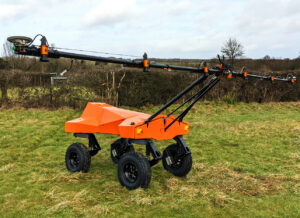
Robots, Autonomous/guided Vehicles, Drones and Satellite imagery, The Internet of Things, Smartphone Applications, AI/Machine Learning.
AgriTech needs to be designed and built. In the South West Advanced Engineering and Manufacturing and digital expertise are key sectors. The region’s High-Value Manufacturing and advanced engineering capability demonstrates the interplay between connected, digital technologies and the creation of physical and virtual AgriTech, e.g. robots, autonomous vehicles, drones and smart device applications, etc. This capability draws on the Internet of Things (including Artificial Intelligence) and physical and digital engineering expertise, to bring together information from different sources and drive the physical act of manufacturing.
Examples of these assets are specifically:
West of England: The Bristol Robotics Laboratory – is a partnership between University of the West of England and the University of Bristol. BRL strives to understand the science, engineering and social role of robotics and embedded intelligence and has provided engineering support to precision agriculture manufacturing projects. The BRL is home to a community of 70 academics and businesses who are leading current thinking in nouvelle and service robotics, intelligent autonomous systems and bio-engineering. Over £1.65 million has been spent on the new facilities. The total area of the BRL is circa 2,400 sqm, with over 300 square metres of specialised laboratory space and two Flying Arenas.
The University of Plymouth are developing ARES Lab (Agricultural Robotics and Environmental Sensors) to build on and support a number of spin out and start up AgriTech companies.
And generally:
All SW Agritech partners are: maximising the economic impact of engineering clusters and multi-disciplinary networks through the continuation of their place-based approaches to anchor, grow and attract High-Value Manufacturing and engineering companies. Local partners facilitate access to investment opportunities and provide the necessary business support, facilities and infrastructure to encourage business growth and to exploit the opportunity to become low carbon technology clusters (a concentration of businesses that are supplying low carbon goods and services). This will provide jobs and progression routes for the advanced manufacturing workforce, as well as AgriTech business start-up opportunities.
One Health - the AgriTech alignment

‘One Health’ is a framework to design and implement programmes, policies, legislation and research in which multiple sectors communicate and work together in an interdisciplinary way to achieve better public health outcomes for humans and animals, particularly by considering the impact of/on the environment. The approach is widely recognised by national and international agencies, such as the World Health Organisation, and is supported by the UK Government. Therefore, a collaborative, long-term, interdisciplinary, and sustainable research effort taking a global One Health approach is needed to address key global issues (G4W Alliance, 2020/21). Food security and supply are key global issues. The development and use of AgriTech is therefore crucial to meet the demand for ‘clean-growth’, sustainable, good quality food production to feed the increasing global population.
In the South West resources are aligning around One Health principles, e.g.:
- SWAN is providing resources to support clean growth innovations in aquaculture technology.
- Cefas and the Department for International Trade order their work around One Health principles and have been key players in supporting regional One Health initiatives.
- All the universities and centres of excellence outlined in this document have built sustainable, clean- growth agriculture/AgriTech principles into their work programmes.
- The One Health Nucleus, another South West LEP supported initiative, will be working across disciplines to incubate a new generation of One Health innovators and entrepreneurs, including those with game-changing innovations in AgriTech.
- South West AgriTech brings together an open network of representatives from across industry, government and academia to generate, promote and support green/clean SME growth in the sector.
Contacts
Cornwall and Isles of Scilly
Dorset
- Joanna Rufus
- Joanna.rufus@dorsetcouncil.gov.uk
- +44 (0) 1305 224797
- Shelley Collins-Trevett
- scollinstrevett@bournemouth.ac.uk
- +44 (0) 7701 294076
GFirst (Gloucestershire)
- info@gfirstlep.com
- Website: www.gfirstlep.com
Heart of the South West (Devon and Somerset)
- Carla Modley
- carla.modley@heartofswelp.co.uk
- + 44 (0)7784 361495
Swindon and Wiltshire
- Russell Frith
- russell.frith@wiltshire.gov.uk
- + 44 (0)7825 101672
West of England (Bath and North East Somerset, North Somerset, Bristol and South Gloucestershire)
- Mandie Berry
- Mandie.Berry@n-somerset.gov.uk
- + 44 (0)1934 426341